|
"Pack your bags you're going to South Korea."
These are the words nine young North Korean defectors had waited years to hear
having traveled thousands of miles.
Unfortunately it was a lie.
The tragic story of this group of
youngsters aged between 15 and 23 takes us back a few years when one by one they
managed to cross the heavily-guarded border from North Korea into China to
search for food. Most of them were orphans, while others had a parent unable or
unwilling to look after them.
A South Korean missionary living
in China, known only as M.J. to protect his identity, tried to help the
youngsters and has broken his silence to CNN.
"This one child used to live with
his father," he explained. "One day his father went into a North Korean military
base trying to find food but was caught and beaten to death on the spot. The
child witnessed this ... his mother then told him not to come home and threw
rocks at him to keep him away."
Rodents 'a
luxury'
Defectors thwarted on the brink of escape
Defectors thwarted on the brink of escape
Defectors thwarted on the brink of escape
Defectors thwarted on the brink of escape
Defectors thwarted on the brink of escape
Defectors thwarted on the brink of escape
HIDE CAPTION
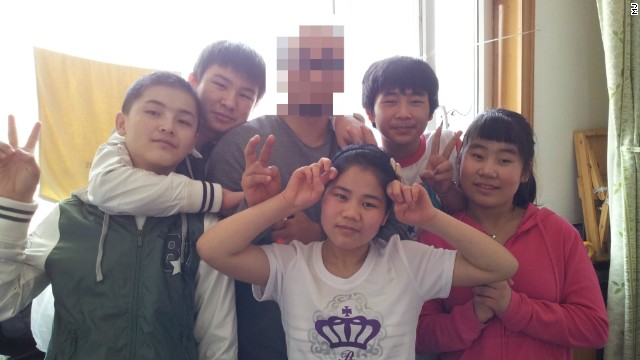 Images: Thwarted on
brink of escape Images: Thwarted on
brink of escape
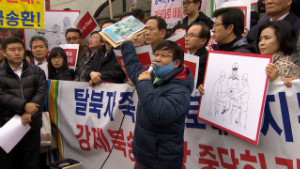 North Korean defectors face
repatriation North Korean defectors face
repatriation
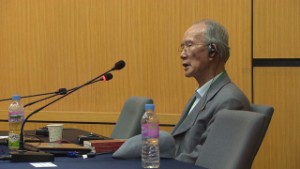 North Korea defectors speak at
UN inquiry North Korea defectors speak at
UN inquiry
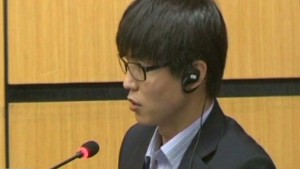 UN hears story of North Korean
torture UN hears story of North Korean
torture
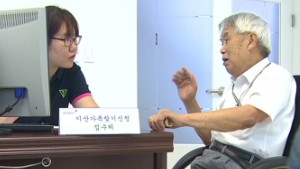 Koreans push for family
reunions Koreans push for family
reunions
The youngsters survived by
foraging for scraps in trashcans. Fish bones and discarded rice were mixed to
make a porridge, while rodents were considered a luxury. When M.J. first met
some of them in December 2009, they had frostbite on their hands and toes from
living in an old abandoned building where temperatures plummeted to as low as
minus 30 degrees Celsius. Some of them had injuries from beatings by security
guards and merchants when they were caught stealing food.
One of the nine, a 20-year-old
man, told M.J. he wanted to live in China as "even beggars in China do not go
hungry."
"These kids were suffering from
malnutrition and disease," recalled M.J. "They had been living in quarters with
bad sanitation ... also they all seemed to have suffered in one form or another
from tuberculosis. Because they were suffering from malnutrition, their growth
was stunted."
M.J. and his wife offered to
help the youngsters leave China for Laos -- a landlocked country in South-East
Asia -- and then onto a third country, perhaps South Korea or the United States
to claim asylum. It is a route that is well traveled by defectors, and the
missionary couple had already helped other North Koreans escape to a better life
that way.
Living in
fear
The nine lived with the couple
and several other North Korean defectors in China for almost two years in
constant fear of being discovered by the authorities. They could never leave the
house during this time. China doesn't treat North Koreans in its territory as
refugees and usually sends them back across the border.
"The children had been fugitives
for a long time so they were used to this situation," he said. "We had a bed
which was buttressed with quite a few books on the bottom as legs. The kids
would go under the bed and kick out the books, so the bed would sit low and it
would not look like anyone was hiding under it."
The couple tried to organize
adoptive parents for the youngsters in the United States but without success.
And so the long trip to the Laos border began.
The youngsters experienced some
firsts along the way: One defector celebrated his birthday for the very first
time; they visited an amusement park, which was a new experience; and they
played barefoot on a beach for the first time. Finally, they were able to enjoy
simple pleasures many children across the world take for granted.
"As we lived with these
children, I saw them change," M.J.'s wife, who also asked not to be identified,
said. "They started having hopes, they started dreaming and I know they were
happier. I was overjoyed to have done something worthwhile."
The escape
After successfully getting six
other defectors out of the country to safety via other routes, the missionary
couple paid a broker to transport the remaining nine across the China-Laos
border because they had no papers or passports. On about May 10 this year, they
embarked on a journey that would take them through the jungle in the dead of
night to avoid detection. This journey would ordinarily take 40 minutes,
according to the missionaries, but this time it took four hours due to heavier
than usual border security that day.
But crossing the border proved
to be the easy part. On a bus en route to the capital, an unexpected police
search changed the course of events. The youngsters were detained and then
investigated for more than two weeks by Laotian immigration officials because of
their lack of paperwork. M.J. admitted the police search surprised him as it had
never happened with previous refugees he had helped pass through the
country.
If we don't pay attention, if we don't keep asking where these children
are, then these children will be lost forever and we will never know what
happened to them.
M.J.
M.J.'s wife said they repeatedly
called the South Korean Embassy in Laos for help. "We pled our case with the
embassy because this was not just about one life but nine lives of young people
... for the embassy it was extra work and a burden to them and why should they
care about these children from North Korea?"
M.J. said embassy officials told
them to wait and do nothing to jeopardize things as Laos authorities were
working to process the youngsters. He said no-one from the embassy visited them
in eighteen days.
Bitter
truth
On May 27, the Laos authorities
told the youngsters to pack as they were being sent to South Korea. M.J. said
they were so happy they all shouted for joy. Years in hiding seemed to finally
be over. But the bitter truth of the situation soon became clear.
The missionary couple was
prevented from following the children and instead locked in a room at the
immigration offices for two hours. The United Nations' refugee agency, UNHCR,
said the group had been sent back to North Korea via China.
Human rights groups were
shocked. The missionaries were devastated.
"In these children's minds, they
were going to South Korea," said M.J.'s wife. "They never imagined after
crossing the border to Laos they would be sent back to North Korea."
The children have since been
used for propaganda purposes in Pyongyang, appearing on state-run television in
June claiming they had been tricked into leaving North Korea and expressing
thanks to leader Kim Jong Un for saving them and bringing them back.
"What I am concerned about is
what is going to happen after the propaganda is gone and the rhetoric is over,"
said M.J. "If we don't pay attention, if we don't keep asking where these
children are, then these children will be lost forever and we will never know
what happened to them."
Laos was widely criticized for
its actions by the U.N. and human rights groups but insists the youngsters were
in their country illegally and that the missionaries were effectively human
traffickers.
South Korea's foreign ministry
told CNN it prioritizes the life and safety of North Korean defectors and is
"inspecting the problems revealed from this incident and has improved and
strengthened the overall support system."
But M.J. and his wife fear for
the nine youngsters, who dreamed of a life without hunger and fear. By Paula Hancocks and KJ
Kwon, CNN
|

 Young North Korean defectors pose for a photo with the
South Korean missionary, known only as M.J. , a few days before they departed
for the China-Laos border in May. M.J.'s face is obscured for his own
safety.
Young North Korean defectors pose for a photo with the
South Korean missionary, known only as M.J. , a few days before they departed
for the China-Laos border in May. M.J.'s face is obscured for his own
safety.
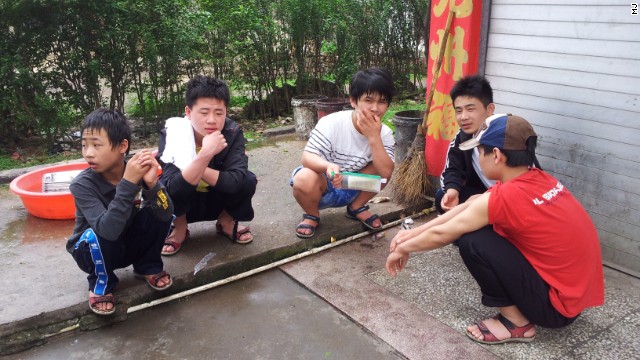 The abandoned youngsters, aged between 15 and 23, had
crossed into China to try to find food and shelter. They were sheltered by M.J.
for two years.
The abandoned youngsters, aged between 15 and 23, had
crossed into China to try to find food and shelter. They were sheltered by M.J.
for two years.
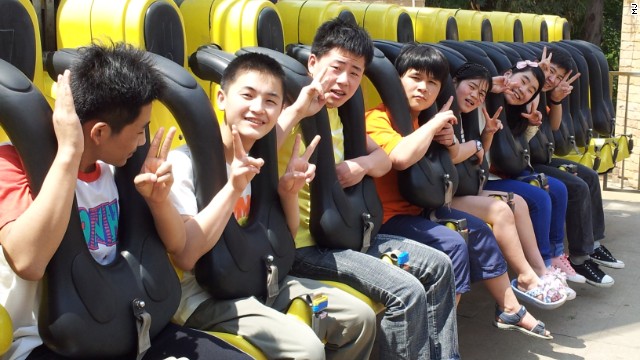 From feeding out of dustbins and frequent beatings, to the
joy of an amusement park trip in China, the group was given hope of a better
life.
From feeding out of dustbins and frequent beatings, to the
joy of an amusement park trip in China, the group was given hope of a better
life.
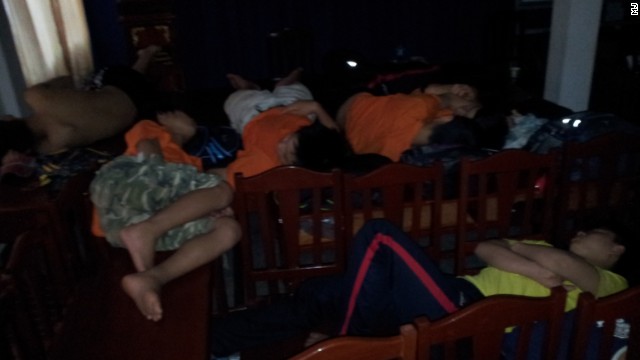 But their world came crashing down shortly after they
crossed into Laos illegally on May 10, when they were caught by police without
papers. Here they sleep at the detention center they were taken to.
But their world came crashing down shortly after they
crossed into Laos illegally on May 10, when they were caught by police without
papers. Here they sleep at the detention center they were taken to.
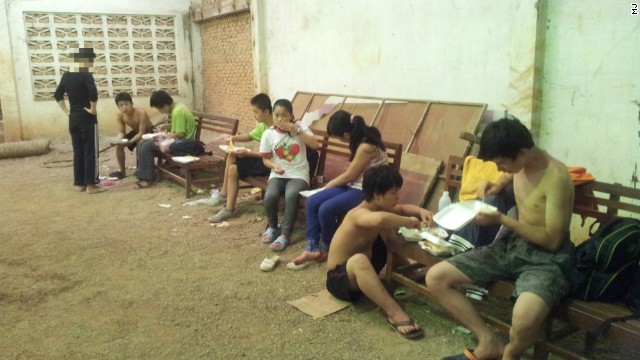 They were kept in cramped conditions at the detention
center for more than two weeks as they awaited their fate.
They were kept in cramped conditions at the detention
center for more than two weeks as they awaited their fate.
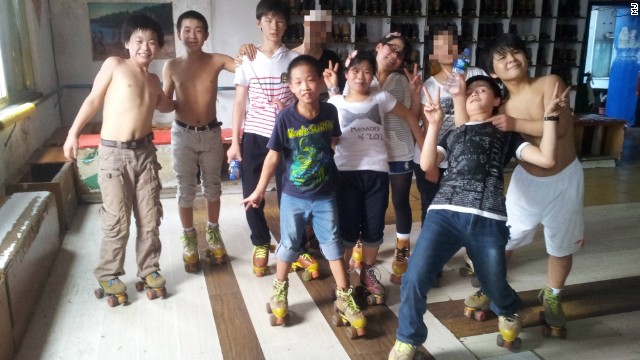 On May 27, the youngsters -- pictured at the detention
center in Laos -- were sent back to North Korea and subsequently paraded as
propaganda tools -- their future uncertain.
On May 27, the youngsters -- pictured at the detention
center in Laos -- were sent back to North Korea and subsequently paraded as
propaganda tools -- their future uncertain.









